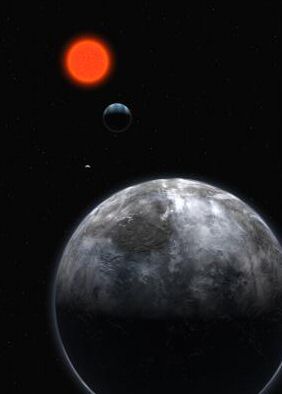
European astronomers say they have detected a distant Earth-like planet with conditions that might allow liquid water to exist. The discovery was made using the European Southern Observatory's 3.6-m telescope and the High Accuracy Radial Velocity for Planetary Searcher (HARPS) spectrograph.
Twenty light-years away orbiting the red dwarf star Gliese 581, the new exoplanet is the most Earth-like discovered to date, with a radius only 50 percent larger than the Earth and with temperatures that would allow water to exist in a liquid state.
"We have estimated that the mean temperature lies between 0 and 40 degrees Celsius, and water would thus be liquid," explains Stéphane Udry, from the Geneva Observatory. "Moreover, its radius should be only 1.5 times the Earth's radius, and models predict that the planet should be either rocky - like our Earth - or covered with oceans."
The new planet's host star, Gliese 581, is among the 100 closest stars to us, located only 20.5 light-years away in the constellation Libra. It is only one third the mass of our sun and is much cooler. Thanks to being just 7 million miles away, the planet completes a full orbit of the star in just 13 days.
Reporting their discovery in Astronomy and Astrophysics, the astronomers said that red dwarfs were ideal targets for the search for low-mass planets where water could be liquid. "Because such dwarfs emit less light, the habitable zone is much closer to them than it is around the Sun," noted Xavier Bonfils, from Lisbon University. "Planets lying in this zone are more easily detected with the radial-velocity method, the most successful technique devised for detecting exoplanets."
French astronomer Xavier Delfosse added that the importance of liquid water could not be underestimated in the search for extraterrestrial life. "Because of its temperature and relative proximity, this planet will most probably be a very important target of the future space missions dedicated to the search for extra-terrestrial life. On the treasure map of the Universe, one would be tempted to mark this planet with an X."

No comments:
Post a Comment